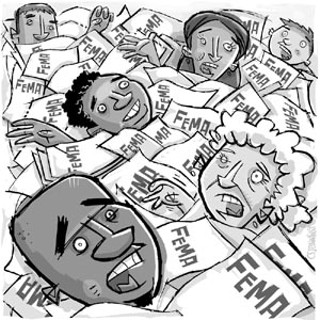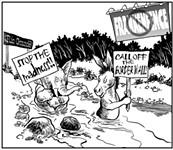FEMA's Flood Tide
One stroke forward, two strokes back – hurricane victims tread rising bureaucratic waters
By Cheryl Smith, Fri., Feb. 24, 2006

Imagine losing everything you own except the clothes on your back and a few things you could toss into a bag or two, fleeing from a flood that decimates the city you call home. Now picture winding up in a place you know nothing about, with nowhere to go but the temporary shelter in which you land. You don't know where many of your family or neighbors are, nor do you have a clue where you're going to live. After a few weeks of sleeping on a cot in a convention hall with hundreds of other people in similar circumstances, you sign up for an apartment at one of the complexes that has a representative at an informational table. At that time, you're told that your new city's department of housing will pay your rent for six months.
You move in, which isn't a complicated process since you have no furniture. The $2,000 of assistance from the Federal Emergency Management Agency that you applied for from the shelter arrives in the mail. You call the 800 number that came with the letter that accompanied the check, and in the course of a series of questions, the FEMA caseworker on the line determines that you should apply to the agency for individual assistance, since that is the next step in disaster aid after the indirect public assistance level, which you are on since FEMA is currently paying your rent and utilities through your new city.
You manage to get your hands on the forms you need to fill out and mail to FEMA, although you have trouble understanding them largely because you've never had to get things done that way before. Back home, most everything was communicated by word of mouth, and besides, the only language you know is English. In the old neighborhood, nobody ever taught you Government Wonk or Legalese. But you finally get your forms completed and sent off, and in a few weeks, you hear back. A letter arrives from Uncle Sam, and he tells you that you don't qualify for individual assistance because you didn't include in your application proof that you're a U.S. citizen. You also didn't include the required documentation of what you paid in rent back home, before the flood. "Have they not been watching the TV in D.C.?" you ask yourself. Do they not know that the water rose to the rafters of your and all your neighbors' roofs and that practically everything in your apartment was either destroyed or washed away?
At the bottom, the rejection letter says you can appeal the decision. A neighbor who has already been through the whole assistance rejection/appeal process helps you get the forms you need and tells you how to go about getting a new social security card and how to attempt to verify your old rent. It takes a few weeks, but you manage to get both things done. You send off your new papers and wait ... and wait ... and wait some more. Then, while you're waiting, you get a letter from the city that says February is the last month it will pay your rent and utilities. You thought you were covered for at least one more month. Suddenly you're not.
Panic.
What's Next?
Now multiply that feeling by 2,000. That's about how many families of Hurricane Katrina evacuees moved from the temporary shelters at the Austin Convention Center and the Toney Burger Center into rental properties throughout town, and up until Wednesday, March 1, the city of Austin was paying their rent – at least indirectly. Back in September, FEMA made deals with cities housing evacuees all over the country. In Austin, the deal was that the city's office of Housing and Community Affairs would enter into six-month lease agreements with the landlords of evacuees who stayed in the shelters, and that the federal government would provide the city with the funds to cover everyone's rent and utilities. FEMA changed its mind in late January, however, announcing that it would stop providing rent money for evacuees' leases nationwide at the end of February and plunging into even deeper housing limbo the hundreds of thousands of evacuees throughout the country who were counting on their local governments to cover rent and utilities for varying degrees of time (for most evacuees in Austin, that would be at least through March).
Other than no longer having a need for public assistance – highly unlikely since as of February 4, the Louisiana Department of Labor was sending unemployment benefits to about 32,520 displaced workers with addresses in Texas alone – the simplest end to this scenario is that an evacuee applies for individual assistance from FEMA and, if approved, receives an initial payment of $2,358, the national average for renting a two-bedroom apartment for three months. If denied, the evacuee has 30 days to arrange rent payment or find another place to live.
Even this scenario is deceptively simple, however. Now, instead of FEMA providing cities with lump sums of money, each evacuee's case must be evaluated separately to determine how much to divvy out. A FEMA case-assessment team has been working since January through Austin/Travis County's Health and Human Services Department to determine evacuees' needs and to help them apply for individual assistance. Eighteen people have been going door-to-door full time, including weekends and evenings, Austin/Travis Co. HHS Director David Lurie said, adding that as of February 10, about 40% of the department's caseload had been assessed. The goal is to have all of the aid-assessment cases completed within 60 to 90 days, Lurie said.

FEMA has said it will continue paying evacuees' bills through their cities on a month-to-month basis until they are transferred from indirect to direct public assistance. Kathy Fields, chief of FEMA's National Processing Service Centers, said during a recent conference call that evacuees receiving indirect public assistance, who as of March 1 are still waiting on the agency to process their direct assistance applications, will continue receiving assistance from FEMA until it decides to accept or reject their applications. Heather Godwin, an attorney with Texas RioGrande Legal Aid's hurricane legal assistance program, said in an e-mail that, "If any evacuee receives a notice to vacate, they should not vacate. Giving up possession of the apartment gives up the right to stay there. The Landlords need to submit invoices to the City for payment, and are unable to evict for non-payment if they have not submitted the invoices."
Lurie said his assessment team hasn't come across any cases of evacuees between assistance suddenly made homeless. "Bottom line is people have not been evicted. They are not being evicted," he said. The question, however, is will they be evicted?
Robbing Peter for Paul
One of the more contentious reasons FEMA gives for rejecting individual assistance is the shared household rule. The agency has been inconsistent about whether it will provide individual assistance to multiple people from the same residence. A late November press release from FEMA states, "FEMA may consider separate applications from:
•Families who lived together before a disaster but who have been displaced in different geographical locations.
•Extended families who lived in different dwellings on the same property.
•Extended households who lived in separate homes before the hurricane and are now temporarily sharing quarters.
•Roommates who lived together before a disaster but who have been displaced in different geographical locations." The press release continues, "These applications may be considered to be duplicates. In such cases, each head of household or roommate should call the FEMA help line and ask for the applications to be unlinked."
Yet, when asked about how FEMA applies its shared household rule, the agency is vague. "We offer split assistance in cases where there is a need for it," said Nicol Andrews, deputy director of FEMA public affairs. If an evacuee applies for individual assistance and is rejected because an ex-roommate has already applied for assistance and gotten it, for example, and then that evacuee appeals that decision and is rejected again, it might be due to some factor other than the fact that someone from his or her previous household has already received assistance, Andrews said. It might be, say, because that second evacuee had renter's insurance and, therefore, the agency decided they didn't need individual assistance.
That rationale is arbitrary at best, said Godwin. She has referred some of her clients whose applications for individual assistance are pending appeal as a result of rejection based on the shared household rule to a New York City law firm representing Katrina evacuees in a class-action suit against FEMA. "It just sounds like a bunch of B.S. Do you think that any of the evacuees in the shelter had renter's insurance? I mean really," she said.

Daniel Greenberg, special counsel for pro bono initiatives at Schulte Roth & Zabel LLP, the firm representing evacuees in the class-action suit, said that as of mid-February, 75% of applications for individual assistance had been rejected, and about 4,000 were still pending. About 2,240 of the application appeals were due to rejection based on the shared household rule, said Greenberg, who got his data from FEMA. The bulk of these applications came out of Louisiana and Texas, he noted. "There are just huge numbers of people that basically aren't getting benefits," he said.
Family Values
Autherine Algere, whose case Godwin referred to Schulte Roth & Zabel, is one of those people. Forty-five-year-old Algere – who, pre-Katrina, was sharing her three-bedroom New Orleans apartment with her son, daughter, six of her 13 grandchildren, and her homeless brother – has tried repeatedly to get individual assistance. (She applied, was rejected, appealed, had her appeal rejected, and is now trying to get her appeal reconsidered, Godwin said.) Her 28-year-old daughter's assistance application apparently got to the agency before Algere's because Algere's application was rejected based on the shared household rule. Algere said she calls FEMA's hotline all the time, and that the conversation always revolves around her daughter. She said FEMA keeps telling her that her daughter is getting individual assistance because she has sent in all the proper documentation, to which Algere responds that she has too. "I've given FEMA every piece of information they could possibly need to clarify that I was head of my house," said Algere, who noted that at one point, the person on the other end of the hotline suggested that Algere could turn her daughter in for fraud for collecting her money. Godwin has since referred Algere's case to Austin Congressman Lloyd Doggett for possible help; Algere said she has faxed documents to his office on multiple occasions.
The other day, at a Valentine's Day party at her complex, Algere asked her landlord about her future at Chelsea Regent apartments, where her two-bedroom unit's rent is $775 a month. Her landlord, Anna Luckie, told her not to worry. Luckie said in an interview that neither she, nor, as far as she was aware, her bosses with Greystar, the company that owns Chelsea Regent, have received any word from the city or any other agency about evacuees' impending rental uncertainty. "We're not just going to evict anybody without exploring all possible avenues to keep them in our communities first," Luckie said. "We'll just see where they're going to get their rental assistance from and we'll go from there."
Algere says she'd like to have it in writing from Chelsea Regent that she's not going to get evicted, but it doesn't worry her enough to start packing boxes. "I'm not stressing like that," she said. Not yet, that is. "When you don't have nothing in writing ... it makes it kind of hard."
Bleak Prospects
As of February 10, Health and Human Services' Lurie said that about half the households interviewed by caseworkers had expressed an interest in staying in Austin, which happens to be the most expensive city in the state. According to the Texas Low Income Housing Information Service, an Austin-based research and advocacy organization for affordable housing, an apartment hunter in the Austin-Round Rock area has to earn $32,160 a year, or $15.46 an hour for 40 hours a week, to be able to afford a two-bedroom apartment and not spend more than 30% of his or her income on housing, the amount recommended by Uncle Sam. That's a frightening economic fact to many Travis County residents since, according to census data, the median, annual per-capita income here is $28,650.
That's even scarier for area Katrina evacuees, who, based on FEMA's calculation of $786 being the national average for one month of rent for a two-bedroom apartment, are receiving seriously inadequate housing aid. (Evacuees have the legal right to ask FEMA to increase that amount in accordance with their city's fair market rent, which is determined by the Department of Housing and Urban Development, Godwin said.) Even if an evacuee qualifies for the maximum in FEMA individual assistance – $26,200 – if living in Austin, he or she still doesn't get enough aid to meet the $32,160 mark. As TLIHIS Co-Director John Henneberger put it, "The economic realities are that they aren't going to be able to afford the rent."
Paul Hilgers, director of Austin's Neighborhood Housing and Community Development office, says that pre-Katrina renters aren't even guaranteed the $26,200 maximum, only previous homeowners. Nowhere does it say that renters don't qualify for the maximum; the program description simply doesn't specify that they do. When asked about this ambiguity, FEMA spokeswoman Susan Solomon said both previous homeowners and renters are eligible for the $26,200 maximum.
Should an evacuee qualify for the maximum, however, the money will stop coming after 18 months. What comes after the individual assistance runs out? At this point, at least as far as anybody can tell, the federal government has no long-term affordable housing plan for evacuees. Henneberger described efforts to find out if there is a long-term plan in the works as being "like trying to nail Jell-O." Not looking beyond FEMA's temporary housing assistance plans, is "just going to vastly swell the ranks of the poor, the uneducated, [and] the alienated that we've already got in this state," he said.
Ken Martin, executive director of the Texas Homeless Network, said the homeless advocacy organizations he works with are all concerned about a surge in the ranks of the homeless. Back in 1999, when the network conducted a statewide survey on homelessness, there were 54,000 to 102,000 homeless in Texas on any given day, Martin said. Although he doesn't have hard data to prove it, he said that range has definitely grown. "We have more homeless people every year," said Martin, referring to the fact that since the mid-eighties, when, among other things, the Texas mental hospital system suffered huge funding cuts, the state's homeless population has steadily increased. "There's less and less [social] services out there," he said, and that's on top of the fact that most new jobs created in recent years are low-paying ones in the service industry. See "Before and After," above. As of June 2005, the last time Austin/Travis County's Homeless Task Force attempted taking a count, there were nearly 1,900 local homeless people, and that's a conservative estimate, said Homeless Services Coordinator Mary Rychlik.
Katrina evacuee Isabella Vinnett, who has been looking for employment for four months with no luck, would be happy to get one of those jobs, however. According to the Louisiana Department of Labor, unemployment benefits for Katrina claimants are currently slated to start running out Saturday, March 4. The 25-year-old rents a unit for $649 a month at the Huntington Meadows complex in Northeast Austin, and is waiting to hear if she has qualified for individual assistance. On top of her uncertain housing situation, Vinnett said she suffers from schizophrenia and that she can't take her medicine because she is pregnant.
"It's stressful. It's very stressful," she said, adding that she is starting to want to go back to New Orleans, where she was renting an apartment in the 9th Ward for $350 a month when Katrina hit. "I'm getting so depressed. ... If it's not one thing, it's another. I'm just completely fucked." ![]()
Got something to say on the subject? Send a letter to the editor.








